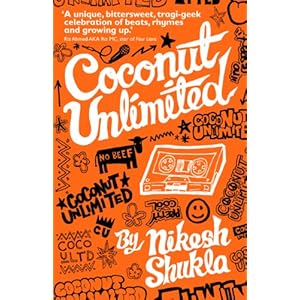 Nikesh Shukla’s first novel is the story of Amit; he and his friends Anand and Nishant are the only Asian boys at their private school in early 1990s Harrow. They find themselves struggling to be accepted anywhere: their ethnicity marks them out as different at school, and their schooling marks them out as different amongst the other Asian kids in town. The boys find refuge in a shared love of rap, and decide to start their own hip-hop band, which they name Coconut Unlimited (after Amit’s sister, Nish, calls him a coconut – ‘white on the inside, brown on the outside’ [p. 28]). They just need a bit of practice first. Okay, maybe a lot of practice…
Nikesh Shukla’s first novel is the story of Amit; he and his friends Anand and Nishant are the only Asian boys at their private school in early 1990s Harrow. They find themselves struggling to be accepted anywhere: their ethnicity marks them out as different at school, and their schooling marks them out as different amongst the other Asian kids in town. The boys find refuge in a shared love of rap, and decide to start their own hip-hop band, which they name Coconut Unlimited (after Amit’s sister, Nish, calls him a coconut – ‘white on the inside, brown on the outside’ [p. 28]). They just need a bit of practice first. Okay, maybe a lot of practice…
This is such a great book, so sharply observed and amusing. At one level, Coconut Unlimited captures gloriously the awkward moments of adolescence. There’s a wonderful scene where, on a family trip to London, Amit is desperate to buy some baggy jeans, and his mum takes charge, dragging him into a streetwear shop and demanding to know where the jeans are… it makes one’s toes curl in empathy. Amit’s first kiss also runs far from smoothly: he doesn’t quite know what to do with his tongue, the experience feels quite strange… These and other moments are vivid demonstrations of the choppy waters through which the teenage Amit is voyaging.
On another level, Shukla’s novel is an acute portrait of putting on a mask in the aim of being perceived in a certain way, and finding that mask uncomfortable to wear. Unable to reconcile the two cultures he’s caught between, Amit tries to define himself by a third; he’s drawn to the glamour of hip-hop, but doesn’t embrace it wholeheartedly. Amit will put on an accent and use street slang, but wants nothing to do with real crime, and is distinctly out of his depth when dealing with local ‘badboy’ Ash (‘the closest thing to ghetto in my life’ [p. 83]). He’s keen to show off his knowledge (real or pretended) of hip-hop as a way of constructing a persona, but is wrong-footed when he meets a new Asian lad at school who seems to know more about the genre than he does. Amit will criticise his sister for the way she lives her life (‘So insular. All her friends were Gujarati. All her references were Indian’ [p. 70]), and he’ll observe that his mother’s sense of having struggled in life is crucial to her notion of self-worth (‘She thought it made her more humble, when in fact it gave her a feeling of martyrdom’ [p. 72]) – but he can’t see the parallels between those and how he’s using hip-hop culture in his life.
There’s a bittersweet note to the story, in that we know from the prologue that the band doesn’t land, and Amit ends up with a comfortable, middle-class English life. But having that knowledge in the back of one’s mind makes for an effective counterpoint to the main narrative, and the journey through the book is highly enjoyable.
Throughout Coconut Unlimited, Amit repeats that he wants his band to be pretty cool. Well, the band might be pretty cool, but the novel is way cooler than that.
Elsewhere
Nikesh Shukla’s website
Metro interview with Shukla
Some other reviews of Coconut Unlimited: Winstonsdad’s Blog; GQ.
Quartet Books
Like this:
Like Loading...
 Nikesh Shukla’s first novel is the story of Amit; he and his friends Anand and Nishant are the only Asian boys at their private school in early 1990s Harrow. They find themselves struggling to be accepted anywhere: their ethnicity marks them out as different at school, and their schooling marks them out as different amongst the other Asian kids in town. The boys find refuge in a shared love of rap, and decide to start their own hip-hop band, which they name Coconut Unlimited (after Amit’s sister, Nish, calls him a coconut – ‘white on the inside, brown on the outside’ [p. 28]). They just need a bit of practice first. Okay, maybe a lot of practice…
Nikesh Shukla’s first novel is the story of Amit; he and his friends Anand and Nishant are the only Asian boys at their private school in early 1990s Harrow. They find themselves struggling to be accepted anywhere: their ethnicity marks them out as different at school, and their schooling marks them out as different amongst the other Asian kids in town. The boys find refuge in a shared love of rap, and decide to start their own hip-hop band, which they name Coconut Unlimited (after Amit’s sister, Nish, calls him a coconut – ‘white on the inside, brown on the outside’ [p. 28]). They just need a bit of practice first. Okay, maybe a lot of practice…
Recent Comments